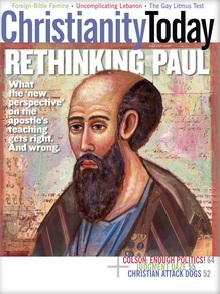 August 2007 Cover Simon Gathercole's What Did Paul Really Mean? article in terms of Dogmas, Doctrines, Distinctives, and Details.* Dogmas. Since the New Perspective focuses narrowly on what Paul says about Justification, which strikes at the heart of Soteriology (the means by which God planned to save mankind), it must be taken seriously. The issue is when the New Perspective is applied to Paul as his dedication “to warning against exclusivist national righteousness” (25) to the destruction of Justification. Gathercole does well critiquing the new perspective while saying that Jews still need to hear the gospel. The crux of his argument is rightfully “Christian faith” not as an add on to life, but something that “requires a complete reorientation of our whole attitude” and “response to God's specific promises” (27). His conclusion describing “what kind of faith” the bible defines and “what is wrong with works of the law” deserves a hearty “amen!” as he stresses that Paul “stresses that God is the sole operator in salvation” (28). Ultimately, he hits the nail on the head by stating that “true unity comes not at the expense of doctrine, but precisely around the central truths of the gospel” (27). Doctrines. Since New Perspective scholars still agree with the traditional meaning of faith, they cannot be called heterodox, but since “advocates of this approach believe that the many cherished concerns of the Protestant Reformation were either wrong or ill-directed” (22) their theology must be addressed since full grown it can violate Christian Dogmas. Areas that New Perspective proponents need to be cautious include: emphasizing that Jews did not think in terms of works-righteousness since Old Testament passages and Rabbinical documents teach that “obedience to the law was rewarded on judgment day” (26) and overemphasizing the collective nature of God's works in Salvation History to the detriment of individual responses to the Gospel. The most destructive is when proponents “confuse the content of justification with its application” so that the inclusion of Gentiles is promoted over the removal of sin, which if unchecked can lead to Universalism, or worse create a theology with no way for anyone to be reckoned righteous before God (26). Gathercole beautifully highlights the inner workings of Justification, though these need not be understood precisely in order for one to be saved. He explains how Justification is “both a legal declaration of our status and a statement about our relationship with God” in which righteousness is imputed to us and there is nothing that can separate a justified person from God (27). Distinctives. As far the New Perspective just sees the ramifications of their understandings on Paul as highlighting God's election of the Jewish nation, Christians should have little reason to quarrel. Sanders concern “about anti-Jewish tendencies in the old perspective and its portrayal of Judaism as inferior to Christianity” (24) should be taken seriously by more Christians. Gathercole's agreement addresses an old sore spot for Christians stating “There can be no place in the church for cheap caricatures of Judaism” (26). In fact, Sanders understanding that “observing the law merely kept Jews in the covenant established by God” was seen as a major contribution until it was poorly applied to Pauline studies (24-25). Christians should learn from Sanders, as Gathercole's affirms, of the fact that traditional Protestants can wrongly read Roman Catholic works-righteousness back into Judaism (26). Details. Much of the debate seems to be largely irrelevant to modern day believers since it focuses on Rabbinic Soteriology. Gathercole states that this “is actually more a new perspective on Judaism than on Paul” since it “reacts against the traditional idea that Jews in Paul's day believed they could accumulate merit before God by their deeds” (24). Even if the assertion that “In the Old Perspective, works of the law are human acts of righteousness performed in order to gain credit before God. In the new perspective, works of the law are elements of Jewish law that accentuate Jewish privilege and mark out Israel from other nations” (24) is true, then it has little affect on Modern believers.
*Dogmas are theories directly impacting God's mission to reconcile all people to Himself (orthodoxy & orthopraxy required).
Doctrines indirectly impact God's mission (and are thus vitally important), but people can fail to interact with or understand them accurately (essential to orthodoxy, not orthopraxy). Distinctives don't affect the orthopraxy of salvation, but will impact the orthopraxy of a church. Details have little to no effect on orthodoxy or orthopraxy.
0 Comments
Leave a Reply. |
AuthorBrett Yardley: Categories
All
Archives
January 2019
|

